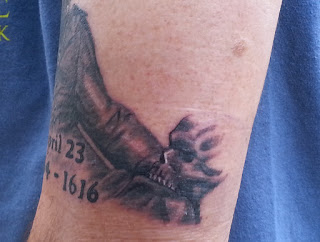Tradition has it that William Shakespeare was born in Stratford-upon-Avon, England on April 23. 1564. During the course of his life, he wrote nearly 40 plays and co-wrote some number of others. He died on April 23, 1616. Yet for a man who lived 400 years ago, his impact on the world has been astonishing. He contributed dozens of common expressions to contemporary speech (e.g., jealousy as the "green eyed monster") and created a number of the most memorable characters in the Western Canon. Some even credit him with creating a model of human consciousness by examining the rich inner lives of his characters.
Yet there were times when these rich cultural treasures could have been lost forever. At the time of his death, only about half his plays had been collected together. Two of his contemporaries, John Heminges and Henry Condell, succeeded in getting the First Folio of Shakespeare's work published in 1623, restoring some nearly lost classics such as Macbeth and As You Like It. Later, legislation enacted by the Puritans crippled theatrical performance from 1642-1660. The Great London Fire of 1666 destroyed nearly half of all editions of the Third Folio.
Our extreme good fortune in having the work of Shakespeare available to us is why the world is celebrating the 400th anniversary of his passing, this year. One of the exceptional things happening this year is that the Folger Shakespeare Library, in cooperation with the Cincinnati Museum Center and the American Library Association, is sending some of the 82 First Folios in its collection out on a nationwide tour. This tour includes all 50 states in the United States, the District of Columbia and Puerto Rico.
Seattle's turn started on March 21 and runs through April 17. Today was our day to visit the First Folio, at the Seattle Public Library..
The terrific thing about this exhibit is that, while it celebrates the First Folio, it was really about a lot more than that one (AMAZING) nearly 400 year old book. OK, I'll look at the First Folio first but there are more cool things to come.
These are the best pictures I got of the First Folio. Obviously, we didn't get to physically touch it but it was open to one of the most well known passages in world literature, Hamlet's "To be or not to be" speech. Even being that close to it physically was like communing with the world of Elizabethan England in some inexplicable way. This IS one of the most famous and important books in the world.
However, Seattle was exceptionally fortunate in that we also had a copy of the Third Folio from the Pigott Collection on exhibit. Moreover, while the First Folio drew a crowd that had a constant stream of people walking in a queue past it, the Third Folio was not looked at quite so much...I got to linger there a bit. The Third Folio was open to As You Like it, specifically Jacques' "All the world's a stage" speech.
Seeing the Third Folio also was quite an unexpected bonus. It is nearly as rare as the First Folio, in that nearly half its printed run was destroyed in the Great Fire of 1666.
We didn't get to physically touch the Third Folio, either, strangely. But the Seattle Library clearly anticipated this frustration by having a number of Folio copies that you could actually flip through. They were quite gorgeous...I think I'll have to add one to my Shakespeare shelves, some day.
There was also an exhibit which highlighted the rich tradition of Shakespeare play performances in Seattle. I've been a fan of the current Seattle Shakespeare company for years, now. It was fascinating to find out how far the area's tradition of performance goes back.
The library has also been hosting a series of performances and lectures to accompany this exhibit.
And there were mementos and kid activities accompanying the exhibit, too.
I really have to congratulate the Seattle Library and its people for doing such a phenomenal job with this exhibit. The exhibit itself was BRILLIANT and the people tracking tickets at its entrance were very friendly, helpful and enthusiastic.
The First Folio's visit to Seattle ends two weeks from today and online tickets were going fast. If you have the time, I seriously recommend try to go...some drop-in admission openings ARE available. Information
here.






